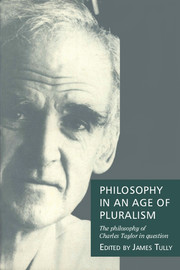Book contents
- Frontmatter
- Contents
- Notes on the contributors
- Preface
- Acknowledgements
- Introduction
- Part I Foundations
- Part II Interpreting modernity
- 3 Modernity and disenchantment: some historical reflections
- 4 Religion, history and moral discourse
- 5 The risks and responsibilities of affirming ordinary life
- Part III Natural and human sciences
- Part IV Philosophy in practice
- Part V Ethics, politics and pluralism
- Part VI Reply and re-articulation
- Bibliography of the works of Charles Taylor
- Index
3 - Modernity and disenchantment: some historical reflections
Published online by Cambridge University Press: 05 June 2012
- Frontmatter
- Contents
- Notes on the contributors
- Preface
- Acknowledgements
- Introduction
- Part I Foundations
- Part II Interpreting modernity
- 3 Modernity and disenchantment: some historical reflections
- 4 Religion, history and moral discourse
- 5 The risks and responsibilities of affirming ordinary life
- Part III Natural and human sciences
- Part IV Philosophy in practice
- Part V Ethics, politics and pluralism
- Part VI Reply and re-articulation
- Bibliography of the works of Charles Taylor
- Index
Summary
The historian Alexander Kinglake wanted the following inscription to be placed on all churches: Important if true. The same motto could equally well be inscribed on Charles Taylor's masterly new survey, Sources of the self. In some measure the appropriateness of the motto is simply a tribute to the intellectual weight of Taylor's achievement, an achievement which it is a pleasure as well as an honour to be helping to celebrate in this book. But in part its appropriateness stems from the fact that Taylor's most recent message, like that of the churches, is that our present secularised outlook may be inadequate to meet the moral challenges posed by modernity. It is this aspect of Taylor's philosophical position on which I should chiefly like to comment.
Taylor's wish to question and transcend our ‘stripped-down secular outlook’ appears in Sources of the self in connection with his analysis of what he takes to be ‘moral imperatives which are felt with particular force in modern culture’. Although Taylor states and restates his list of these imperatives at a number of different points, he cannot, I think, be said to do so at any stage with complete consistency. Without being overschematic, however, I think one can say that he distinguishes four main elements in our modern vision of ‘strongly valued’ goods.
- Type
- Chapter
- Information
- Philosophy in an Age of PluralismThe Philosophy of Charles Taylor in Question, pp. 37 - 48Publisher: Cambridge University PressPrint publication year: 1994
- 20
- Cited by



